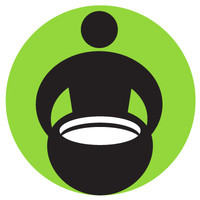This is the second article in a series on "The Future of Fair Trade," written in collaboration with Fair Trade USA. A 501 (c) (3) nonprofit organization, Fair Trade USA is the leading third-party certifier of Fair Trade products in the United States. To follow along with the rest of the series, click here.
Consider these numbers: According to the UN, women constitute half of the world’s population, perform nearly two-thirds of its work hours, produce half of the world’s food, and yet only receive one-tenth of the world’s income. Women own just a tiny fraction of the world’s property, and represent about 70 percent of the world’s poor – meaning nearly two out of every three adults living in poverty are women.
Carrying an uneven burden of the world’s poverty, women often face unequal treatment, discrimination, and harassment in many agricultural communities and garment factories across the globe.
Fair Trade certification is a way to change this story. Fair Trade Certified farms continue to empower women, not only through labor protections required by the Fair Trade standards, but also through opportunities for education, scholarships, leadership roles, and micro-finance programs. Fair Trade gives women a voice in a sector where many are invisible.
Building a better tomorrow with Fair Trade
Fair Trade empowers over 1.3 million farmers and farm workers around the world, about 30 percent of which are women. Women who are part of Fair Trade Certified cooperatives, as well as those currently working on Fair Trade estates in tea, flowers and bananas, are guaranteed access to things like health care, education labor protections, and freedom from harassment. Fair Trade also enables female farmers and workers to play leadership roles in the business and the community.
Many Fair Trade farms collectively decide to use their community development premiums on Women’s Empowerment Programs, in areas like alternative income, family planning, women’s health, training, education, and projects to assist mothers. We’d like to share some of their stories below.
A better life is blooming
The majority of flower workers around the world are women. Unfortunately, flower workers often spend long hours in greenhouses surrounded by harmful agrochemicals and pesticides. Wages are barely enough to keep food on the table, and workers can be terminated at a moment’s notice, especially after a major holiday, such as Valentine’s Day, when demand for flowers suddenly drops.Yet Fair Trade certification is changing these harmful practices. Take, for example, the joint body at Hoja Verde, one of nine Fair Trade Certified flower farms in Ecuador.
Silvia Mariana Cualchi Rojas is a single mother who has worked on the Hoja Verde Flower Farm for seven years. Divorced, life on her own has been tough for Silvia and her son, but she believes that her future is brighter; thanks to the benefits she now receives from Fair Trade at Hoja Verde such as a discount grocery store, pediatric assistance, free eye exams and cervical cancer screenings.
Yet, of all these benefits, none were as significant to Silvia as the ability to provide her son with the most of basic of human needs – a home. When Silvia separated from her husband, she and her son were left with no place to live. Despite multiple attempts, she was unable to qualify for a loan because of her income – until Fair Trade. In 2008, Silvia, along with 17 other employees, was granted a low-interest loan from Hoja Verde’s Housing Maintenance Program. With a $540 loan, she was finally able to obtain the title to the land that had once belonged to her parents. With another loan of $3,000, she began construction on a home to call her own, one paid for entirely by her hard-earned salary.
“When I separated from my husband, my son and I had no place to go. Hoja Verde’s Housing Maintenance Program put a roof over our heads and pride in our hearts.” – Silvia Mariana Cualchi Rojas
Innovation in Liberia
In 2003, Liberia emerged from 13 years of civil war. In Liberia’s weak and struggling economy, women are excluded from the most productive sectors of the economy: rubber, timber, and diamonds. In this dire economic, social, and political situation, thirty women have set out to prove themselves as anything but helpless. They are the Liberian Women’s Sewing Project (LWSP). LWSP works to create sustainable livelihoods for the people of Liberia, and Fair Trade can offer a means to achieve this. The LWSP fosters a safe and progressive environment for its workers. In a hot climate, these women work in air-conditioning. In a country where 80 percent of people are unemployed, these women earn 30 percent more than a government employee. Each has her own matched savings account with the factory. For every dollar that she saves, the factory contributes that same amount to her savings account. This creates the possibility for savings for otherwise impoverished women. The women receive medical insurance and a 50-kilo bag of rice every month. These benefits enable women to support their families, which range in size from four to 16 people who depend on their income.
With the promise of a brighter future, these women continue to persevere in tough economic times. As they work, they sing: “Things are getting better. Yes, yes, yes… Things are getting better.” Because for them – with the prospect of Fair Trade – things are getting better.
Click here to learn more about the women of Fair Trade.

Fair Trade USA is a nonprofit organization that is the leading third-party certifier of Fair Trade products in the United States. Fair Trade USA audits and certifies transactions between U.S. companies and their international suppliers to guarantee that the farmers and workers producing Fair Trade Certified goods were paid fair prices and wages, work in safe conditions, protect the environment, and receive community development funds to empower and uplift their communities.














